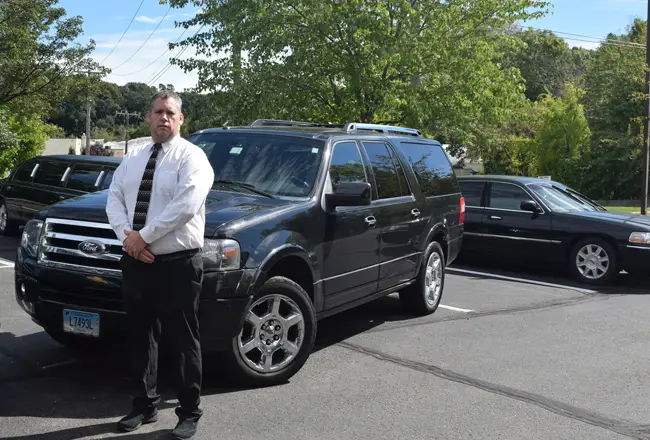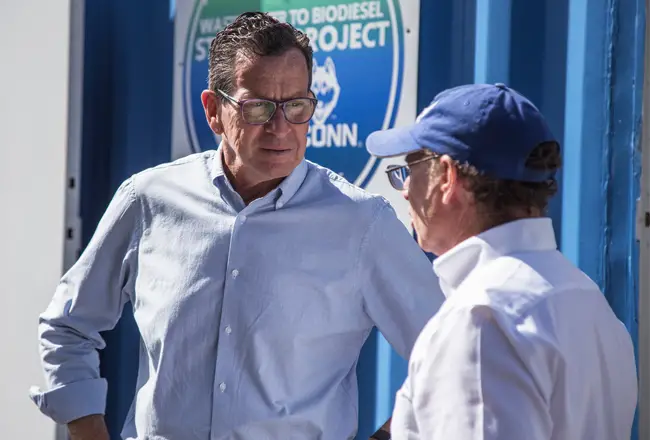
Sean P. Morris had no plans to be involved in the transportation business, but when he took a part-time job as a limousine driver to help cover the costs of his wedding, he found himself enjoying the interactions with his passengers and the satisfaction they expressed in being driven to their destinations. In 2006, when a friend who owned a limousine service consisting of two Lincoln Town Cars wanted to change fields, Morris left his job as a business sales manager at AT&T Wireless and purchased the operation.
Today, Morris”™ Redding-based Absolute Transportation LLC serves western Connecticut with a fleet of town cars, SUVs, vans and a stretch limousine. In the 12 years since he acquired the company, Morris has grown it into a substantial operation, with four full-time drivers and three part-timers on call.
“We”™re transporting about 150 passengers a week,” he said. “Our business is about 85 percent business related, mostly with airport runs. We”™re constantly going back and forth from JFK, LaGuardia and Newark airports from the western Connecticut area.”
The active member of Redding”™s Georgetown Volunteer Fire Department faces more than a few challenges in running a limousine business in Connecticut. Highway congestion has become the rule rather than the exception.
“Traffic in western Connecticut is becoming unpredictable,” Morris said. “Typically, when coming into the Danbury market in afternoons, it is now backed up from 684 to 84 and it is sluggish on 84 until you get through Danbury. In the morning, traffic is mostly backed up from the Danbury line all the way to 684, and sometimes it depends how well 684 is moving. Sometimes it is sluggish to the Hutchinson River Parkway.”
Morris needs to work with passengers to plan a trip that doesn”™t get ruined by traffic jams.
“We give everyone a lot of extra lead time,” he continued. “LaGuardia Airport is normally an hour from this area and we give them an hour and a half. Plus, we build in two hours of wait time at the airport, so we add an extra hour to our times so we don”™t run into any extra problems.”
If traffic is not bad enough, there is also the question of Connecticut”™s gas prices. As of Oct. 9, Connecticut”™s average gas price according to AAA was $3.03 per gallon while the national average was $2.91.
Morris said trying to contain the cost of filling the tanks was not fun.
“Whenever we went to New Jersey, we”™d fill up there because it was 50 cents cheaper down there,” he said. “Now, we”™re asking drivers to try and fill up at the cheapest gas stations they find. One of the drivers has a Costco membership, so that saves some money when he fills up. That is a bad part of our business ”” when we spend so much money on gas.”
And there is the irritation created by ride-sharing services such as Uber and Lyft.
Morris complained that the state has enabled these services to freely operate without requiring the same tough standards applied to taxi and livery companies.
“With car insurance, I have to carry $1.5 million in car insurance on all the vehicles,” said Morris. “And our drivers are fully background checked. If they have a felony, they can”™t drive a passenger. What you are seeing nationwide on the news is that Uber doesn”™t care about felonies. A few weeks ago in Stamford, they caught a Danbury native as an Uber driver who had cocaine on him. Is that the kind of people you want to get in a car with to go to the airport? If a driver gets pulled over and there is cocaine in the car, the passenger is going to get tied up in this whole mix.”
Nonetheless, Morris notes that there are positive aspects to running his business. For starters, staff turnover has been minimal, with his longest-serving driver being a presence behind the wheel since February 2007. And he is planning to launch a new app by the end of the year that will speed up the ability for clients to book vehicles. While Morris”™ fleet frequently takes partygoers as clients, his company has experienced a near-perfect record of mature and responsible passengers that do not create chaos in the backseat.
“I”™ve only had one incident where a passenger really got out of control,” he recalled. “It happened to be right in front of a police department in Hartford. The police officers came out and talked to her and she calmed down. She ended up being a couple of blocks from her house, so she wound up walking home.”
Morris has also been impressed with passenger preferences for fuel-efficient transportation. “People traveling don”™t need the very large cars that once were the staple of our market,” he said. “Business travelers are being a little more savvy with how they”™re traveling and they”™re going with some of the environmentally friendly vehicles.”
But if there is a potential dark cloud on Morris”™ horizon, it would involve the possibility of bringing tolls back to Connecticut, especially if the state sets up its own E-ZPass system. He complained that the initial concept of discounts applied to all participants in the E-ZPass system was thrown off-kilter when New York City would not allow E-ZPass holders from other states to receive a discount at the city”™s bridges and tunnels.
“I got my E-ZPass out of New Jersey and my E-ZPass bill went up one day by $4,000,” he stated. “It was a complete shock. I had no idea what had happened. I had to cancel the New Jersey account to get the New York City E-ZPass and get the city discount. Then, New Jersey saw what New York City did and you have to pay the cash rate there for E-ZPass. When one state does something, other states follow. And the concept that you”™d get a discount because you had your money in their system has all gone away. In the end, it is hurting businesses such as mine.”



















